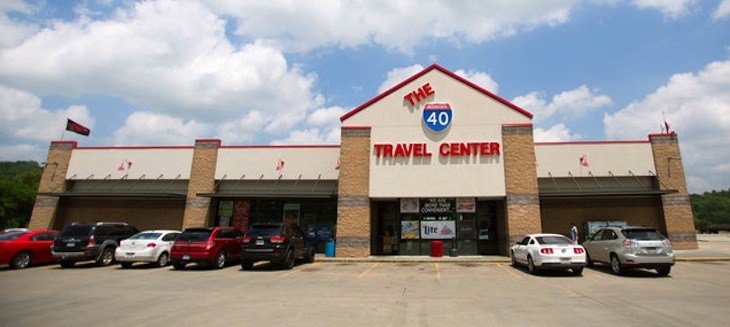Workman’s Travel Centers hires Chef Steven Brooks to run its restaurants
by January 17, 2018 5:28 pm 3,475 views

The gas station and convenience store industry has evolved, and few nationwide brands continue to grow their footprint while some have closed. But Arkansas-based, family-owned Workman’s Travel Centers looks to expand in time of tepid industry growth.
Among nationwide brands like Kum & Go and Casey’s General Store, Workman’s is expanding its footprint as it develops its restaurant and foodservice business with the help of executive chef Steven Brooks.
In December, the company hired Brooks as its full-time executive chef, co-owner Kathryn Workman-Burger said. Brooks is host and executive producer of “Cook with Brooks,” a 30-minute TV show airing on statewide PBS affiliate AETN.
“Food is where it’s at,” Workman-Burger said.
Brooks, who started Jan. 1, has been learning the aspects of the business and spending time at the existing locations. He’s also working to hire staff for the company’s new Lowell location.
The family has purchased food from Van Buren-based Tankersley Foodservice for a long time, and Brooks was the company’s executive chef, Workman-Burger said. Her parents have operated convenience stores since the 1980s, and the family has a good handle on the front end of the business but needed expertise with the restaurant. Its existing locations on Interstate 40 in Ozark and Interstate 49 in Rudy both have full-service restaurants and are open 24-hours daily.
In Lowell, Workman’s Travel Center at I-49 and Arkansas Highway 264 is expected to open in mid-March, Workman-Burger said. Brooks will help run its restaurant, and it will include a smokehouse. Workman’s Travel Centers also offer delis with sandwiches and Southern food. Plans are to add smokehouses at the existing locations, and they have discussed options to purchase fresh ingredients from the communities in which they operate.
DECLINING STORE NUMBERS
Between 2007 and 2015, the number of U.S. gas stations including those with convenience stores fell 3.4% to 111,604, according to the most recent data from the U.S. Census Bureau. In Arkansas, the number of gas stations declined 2.4% to 1,571. In the Fort Smith metro, it fell 11.3% to 157. In the Jonesboro metro, it declined 9.1% to 60. In the Little Rock metro, it’s increased 3.4% to 336. In the Northwest Arkansas metro, it’s fallen 8% to 173.
About 85% of gas stations have convenience stores, and the number of gas stations with convenience stores, which excludes those without the stores, rose less than 2% to 96,970, between 2007 and 2015, according to the Census Bureau. In Arkansas, the number was flat at 1,382 stores over the period. In the Little Rock metro area, the number of gas stations with convenience stores rose 6.5% to 311. But in the Fort Smith, Jonesboro and Northwest Arkansas metro areas, the number of stores fell 10.4% to 146, 5.2% to 55 and 3.5% to 165, respectively.
While many independently-owned travel centers have closed, Workman’s Travel Centers is working to grow. What sets it apart from other travel centers is its ability to make quick decisions, Workman-Burger said. It can respond quickly to the individual needs of each location. In Rudy, it was able to retrofit its pumps to allow for DEF, an additive truck drivers must add when they fill up.
When asked about how the business is planning for electric vehicles, Workman-Burger said wiring for electric vehicle charging stations has been added at the Lowell location. The charging stations can be added later, if needed, without removing existing gas pumps.
Between 2006 and 2016, the number of electric vehicles in the United States rose 502% to 563,710, according to the International Energy Agency’s Global EV Outlook 2017. Between 2015 and 2016, the number of electric vehicles increased 39.5%, from 404,090. In the third quarter of 2017, 1.75% of all U.S. vehicles in operation were electric vehicles, according to Experian.
For now, gas and diesel remain the dominate fuels for Workman’s Travel Centers. The Lowell location will include 10 fuel pumps, or 20 fueling positions, in the front for passenger vehicles and five pumps, or 10 fueling positions, in the back for big rigs.
Its store will be 18,000 square feet or about 3,000 square feet larger than the Ozark location. The family entered the travel center business about 11 years ago, and looks to expand the business to Oklahoma and Missouri. The family recently purchased land to build a location in Shawnee, Okla., and has looked at land in Joplin, Mo.
GAS AND NON-GAS SALES
About two-thirds of convenience store profits can be attributed to non-gas items like beverages or tobacco products, and this holds true for Workman’s Travel Centers, Workman-Burger said. When asked if sales have been impacted by ride-sharing companies, like Uber and Lyft, she said she hasn’t seen a decline in business related to ride sharing.
Motorists will always need a place to stop to use the bathroom and eat, but good business depends on the offerings, like clean bathrooms, she said. The Rudy location has a dog park, as many motorists travel with pets. And as freight demand grows, the company continues to see its fuel sales rise.
“We’re making a good margin on gas sales,” she said.
Increased fuel demand has led gas prices to rise 4 cents to $2.53 per gallon, according to AAA. Over the past week, demand increased by 164,000 barrels to 8.8 million barrels, according to the U.S. Energy Information Administration, and it was the highest demand for the first EIA report of January since 2011.
Prices are expected to continue to rise if demand increases, said Jeanette Casselano, AAA spokesperson. Arkansas has the fifth least expensive gas price at $2.30 per gallon, just 2 cents per gallon more than Texas, the state with the least expensive gas.
